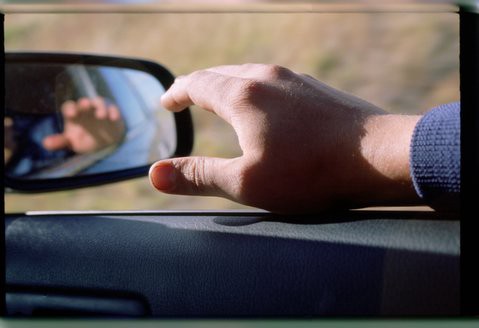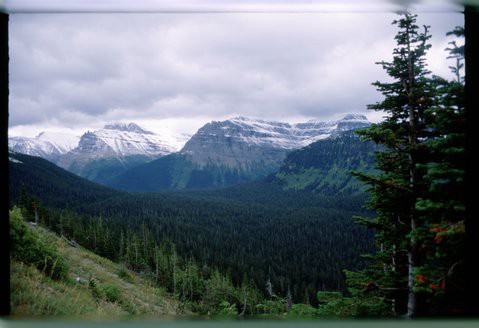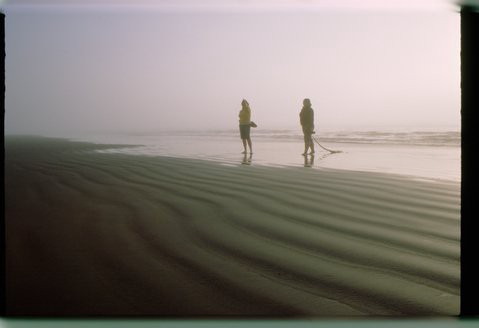The Cost of a Road Trip
by Megan Reynolds

The idea of the road trip was hatched in the dark corner of a bar in Cambridge, sparked by the restlessness that accompanies all college graduates, ready to start the rest of their lives without a solid road map. I was moving to California, because it seemed better than spending a year sitting on my dad’s couch in upstate New York, and Wendy and Kyle, friends from college, were coming with me. We’d sleep under the stars, drink a lot of regional cheap beer, and spend a lot of time gazing pensively at corn fields out a dirty car window, writing in our journals. It was the perfect plan, the best way to delay adulthood, and an efficient and somewhat cheap vacation.
It was August in 2005. The south had just been decimated by Hurricane Katrina, so we plotted a northern course, based around national parks and campsites — Badlands, Glacier National Park and Yellowstone.Wendy and I bought an atlas and traced a potential route that brought us to Chicago to visit friends, then winding through the north, soaking up the early fall and ending up in San Francisco, ready for what were sure to be new and deeply meaningful lives.
It is still a mystery how we paid for this excursion. I had maybe $400 in the bank, and a reluctant father who didn’t really have that much extra to give for what was really a delay of my Adult Life. Wendy had money from her parents. Kyle sold a gold coin inherited from his grandmother in the diamond district, and was thus armed with $400 in cash and his father’s American Express. Gas started at $3.50 a gallon, but soon climbed to $4. As the only member of our caravan without a license, I pumped gas at every rest stop across the country, dutifully noting who paid and putting it in our ledger, a large Ziploc bag that floated around in the detritus of the backseat.
Our supplies were limited. We intended on camping instead of staying at motels, and we’d eat the sort of fare that you get at rest stops and grocery stores in the out of the way parts of the country — beef jerky, cheese and crackers, a lot of hot dogs, and cheap plates of biscuits and gravy eaten at diners along the way. We had a tent, a sleeping bag each, some pillows, a giant cooler, and a lot of ambition.
We spent a few days in Chicago, visiting friends and walking around Millenium Park in the relentless heat of early September, but we were eager to get on the road. At some anonymous rest stop outside of Chicago, Wendy put her wallet on top of the car, then got back in and drove off. By the time she realized this, we were deep in the middle of nowhere, driving through endless corn fields and faceless rest stops, and lost an hour or three trying to figure out what to do.
Wendy wanted to recreate the scene of the crime, by filling a back up wallet she had with stones, putting it on the roof of the car and then driving for a spell, in an attempt to predict where and when the wallet had fallen off, and then backtrack our steps, to where the wallet would certainly be waiting patiently for us, on the side of a busy interstate. We had to to hatch a contingency plan. After frantic phone calls to parents, and an uneasy exchange in which I gave Wendy’s father my bank account information over the phone, it was settled. For the remainder of the trip, we’d operate out of one bank account, Wendy’s father depositing healthy sums on top of my dwindling and relatively small pile of cash.

We were as frugal as we could be, given the circumstances. Most nights were spent sleeping outdoors, three bodies reeking of woodsmoke crammed in a tent somewhere beautiful. On Kyle’s birthday, we drove to the Horseshoe Bar in Interior, a town of 67, where a tumbleweed literally rolled by us as we got out of the car. We played pool and got drunk, while Wendy made friends with a rancher named Curtis. We drove back slowly in the pitch black, thankful to collapse in our tent, grateful that we made it back alive.
One night, we got the idea to take a detour to Vancouver, and drove up the coast of Washington to the border, where we were turned away because I couldn’t find my passport. That morning we drove straight through rush-hour traffic headed towards Seattle, and splurged on a room at a Motel 6 in Everett, where we drank vast quantities of cheap red wine and took long, hot showers.
The car became our home and traveling garbage can, full of growing piles of dirty clothes, bags of beef jerky and countless empty packs of cigarettes, crunching under our feet like leaves in the fall. Periodically, we’d stop to clean out the car, and reorganize the trunk, which was a task that usually took an hour or two, and consisted of unpacking the entire thing, searching for a misplaced sweatshirt or clean pair of socks, then haphazardly throwing everything back. Halfway through, we were able to locate the camping lantern, or Kyle’s pillow by memory only.
The desire to put off impending responsibility kept us on the road for longer than we’d anticipated. Finances grew increasingly tight, and conversations about money, who paid for gas, and equal contributions were underscored with the anxiety of what would happen after this trip was over. It became increasingly difficult to keep track of what money was Wendy’s and what money was mine, and checking my bank account became a ballet of scribbled arithmetic and an exercise in short-term memory. When we finally sat down to do the work of figuring out who owed what, it was tense. Here is a free tip: Avoid merging bank accounts with your best friend, at all costs.
There are ways to keep track of finances when you’re on the road that do not involve a Ziploc bag and good faith. It is a miracle that we didn’t run out of money. It is a miracle that we never ran out of gas. It is a miracle we made it across the country in the first place.
• Gas: I think it was around $350, all told.
• Camping fees at a variety of national parks: $119
• That hotel in Everett, with the hot shower: $60
• How much I owed Wendy after we disentangled our finances: $100? $200? Let’s call it $150
• Beef jerky, Parliament Lights, Combos, postcards, cheap beer: $250
Total: $929

Support The Billfold
The Billfold continues to exist thanks to support from our readers. Help us continue to do our work by making a monthly pledge on Patreon or a one-time-only contribution through PayPal.
Comments